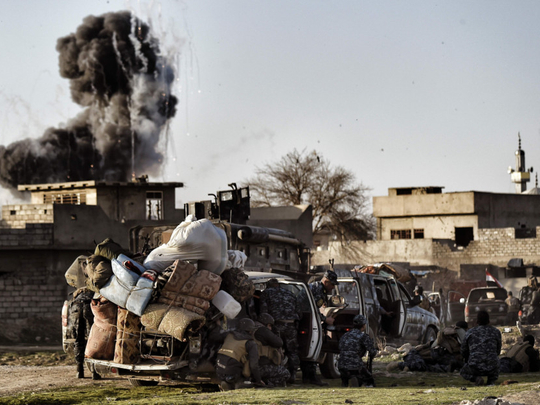
This may sound naive, unrealistic, untimely and even politically incorrect for some when interlocutors are trying to kick-start a political process that aims to end the gruelling six-year war in Syria.
But with all the meetings, UN resolutions, shaky ceasefires and temporary truces, and with all the tricky negotiations over transitional phases, draft constitutions, future elections and the composition of opposition delegations, no one is talking about Syria war crimes, mounting evidence of summary executions, torture, rape, use of chemical weapons, disappearances, mass graves, forced displacements and the deliberate extermination of opponents.
A recent report by Amnesty International (AI) revealed that at least 13,000 opponents of the regime were executed through mass hangings at the notorious Sednaya prison over the past four years. The report, which was categorically denied by the government, cited evidence of on-going torture and extrajudicial executions. It was not the first indictment of the regime of President Bashar Al Assad since the eruption of the popular uprising against him in 2011.
Last August AI reported that at least 18,000 detainees had perished in secret prisons run by the regime. It said that an average of 10 people have been killed every day by beatings, disease and neglect in secretive detention facilities. It backed its report through testimonies. And in February last year a UN commission of inquiry issued a report in which it accused the government of killing detainees on a massive scale, “amounting to a state policy of extermination of the civilian population, a crime against humanity.”
The report also accused Fatah Al Sham (formerly known as the Al Nusra Front) and Daesh (the self-proclaimed Islamic State of Iraq and the Levant) of mass killings and torture of prisoners. It added that thousands more have “disappeared” after being arrested by state forces or gone missing after abduction by armed groups.
In its report a year ago, the United Nations Human Rights Council accused the Syrian government of “committing crimes against humanity of extermination, murder, rape or other forms of sexual violence, torture, imprisonment, enforced disappearance and other inhuman acts.” It suggested that government forces killed women and children — some as young as seven.
Cache of horrific images
And in December last year Human Rights Watch (HRW) issued another report following the investigation of stories behind the more than 28,000 gruesome photos of deaths in government custody. The cache of horrific photos was smuggled out of Syria in January 2014. HRW called on countries involved in peace negotiations in Syria, including Russia, to make the fate of the thousands of detained people in Syria a priority, adding that these countries should insist that the Syrian government give international monitors immediate access to all detention centres.
But this disturbing issue does not feature on the agenda of proposed peace talks. And with calls for Al Assad’s removal appearing to recede, the tragic possibility that the regime could get away with murder, torture and documented war crimes is increasing. A political deal, although still remote, may come at the expense of tens of thousands of victims who have perished in Al Assad’s prisons. This could be a dangerous precedent that would encourage other rogue regimes to violate international laws and conventions.
Civil wars are complex in nature as accusations of torture, rape, extrajudicial killings and others are traded by various parties. Fact-finding missions are usually formed once peace has been achieved and it takes years for such enquiries to deliver their reports. Syria must not be the exception. No matter what a political deal on Syria may look like in the end, it is crucial that war crimes and crimes against humanity are not ignored regardless of the consequences.
The will of the international community and its moral, and indeed legal, obligation won the day following the brutal civil war in former Yugoslavia. The UN Security Council established the special International Criminal Tribunal for the former Yugoslavia (ICTY) in 1993. It investigated grave breaches of the Geneva Conventions, violations of the laws or customs of war, genocide, and crimes against humanity.By 2005 it had indicted more than 160 persons and the trials at The Hague are still ongoing. A similar international tribunal was set up in 1994 to investigate those responsible for the Rwandan genocide.
Political consensus among the permanent members of the Security Council allowed such tribunals to exist and to hunt down war criminals. Such consensus in needed today on Syria as a matter of principle regardless of the nature of the political formula that will be eventually reached to end the war there. The integrity of the UN and international conventions depend on it.
Since 2011, a special UN Commission of Inquiry (COI) has issued at least 20 reports accusing the Syrian government, rebel forces and Daesh of mass killings, rapes, disappearances and recruiting child soldiers. But the COI lacks a prosecutorial mandate. Last week it was announced that a new body, voted by the General Assembly, is being set up at the UN in Geneva to prepare prosecutions of war crimes committed in Syria. It has its work cut out — not in the sense of collecting evidence but in convincing the big powers, especially Russia, that there is a case to be brought to the International Criminal Court (ICC) or that a special tribunal must be formed on Syria.
It will take years — maybe never — for justice to be served in Syria.
Osama Al Sharif is a journalist and political commentator based in Amman.










